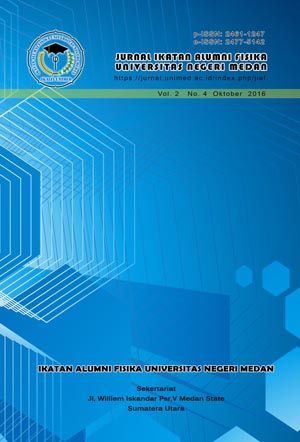THE EFFECT OF PROBLEM BASED LEARNING MODEL STUDENTS ACHIEVEMENT ON STATIC FLUID TOPIC AT YEAR XI OF SMA NEGERI2 LINTQNGNIHUTA ACADEMIC YEAR 2015/2016
DOI:
https://doi.org/10.24114/jiaf.v2i4.7791Keywords:
Student's Achiement, problem based learning, quasi experimentalAbstract
This research is aimed to know and describe the student's Achievement using problem based learning and conventional learning about static fluid topic . This research employed a quasi experimental pretest and posttest with control design. The populations were 60 students grade Xl-science in SMAN 2 Lintongnihuta academic year 2015/2016. The samples consist of two classes, one class with 30 students as experiment class and one class as control class with 30 students, while the sampling technique used purposif sampling. Research instrument used essay test. The data obtained in the study were analyzed by the computer program Ms.Excel. From the research the pre-test average value of outcomes experiment class 26.66 and control class 27.83, after giving the treatment the post-test with the average value of outcomes experiment class 59.66 and control class 49.50. The result of t test Uunt = 3.158 while ttabie= 1.661. Because tc<>unl>ttabie(3.158> 1.661) so Ho rejected. The result showed that student's achievement in experiment class had been treated with problem based learning model have significantly different from control class which had been treated with conventional learning. In addition, the improvement of PBL in experiment class was greater than in control class. This meant implementation problem based learning has a significant effect toward student achievement.References
Dolmans, D. Wolfhagen, I & Vleuten, C. (2006). Why aren't They Working?.In P. Schwartz, S. Mennin, & G. Webb. Problem- Based Learning:Case Studies, Experience and Practice. London & New York. Routledgc.
Eldy, E. F and Fauzian, S. (2013). The Role of PBL in Improving Physics Student's Creative Thinking and its Imprint of Gender, International Journal of Education and Research 1(6).
Etherington, M. B. (2014). Investigate Primary Science: Problem Based Learning Approach. Australian Journal of Teacher Education 36(9).
Prayoga, Z. N. 2013. Kemampuan berpikir kritis siswa pada pembelajaran materi pengelolaan lingkungan dengan pendekatan keterampilan proses sains. Skripsi. Semarang: Universitas Negeri Semarang
Ramphele, M. (2015). Meaning and Mission. European Journal of Education 50(1). Ronfeldt, M, Farmer, and Mc Queen. (201 5), Teacher Collaboration in Instru ctional Teams and Student Achieve ment, American Educational Research Journal 52(3): 475-514. Sudjana, (2005), Metode Statistika,Penerbit Tarsito, Bandung.
Tamim, R. S and Michael, M. G. (2013). Defenitions and Uses: Case Study of Teachers Implementing Project-based Learning, Interdisciplinary Journal of Problem-Based Learning 7(2).
Downloads
Published
Issue
Section
License
Copyright (c) 2017 JURNAL IKATAN ALUMNI FISIKA

This work is licensed under a Creative Commons Attribution 4.0 International License.
Authors who publish with this journal agree to the following terms:- Authors retain copyright and grant the journal right of first publication with the work simultaneously licensed under a Creative Commons Attribution License that allows others to share the work with an acknowledgement of the work's authorship and initial publication in this journal.
- Authors are able to enter into separate, additional contractual arrangements for the non-exclusive distribution of the journal's published version of the work (e.g., post it to an institutional repository or publish it in a book), with an acknowledgement of its initial publication in this journal.
- Authors are permitted and encouraged to post their work online (e.g., in institutional repositories or on their website) prior to and during the submission process, as it can lead to productive exchanges, as well as earlier and greater citation of published work (See The Effect of Open Access).

